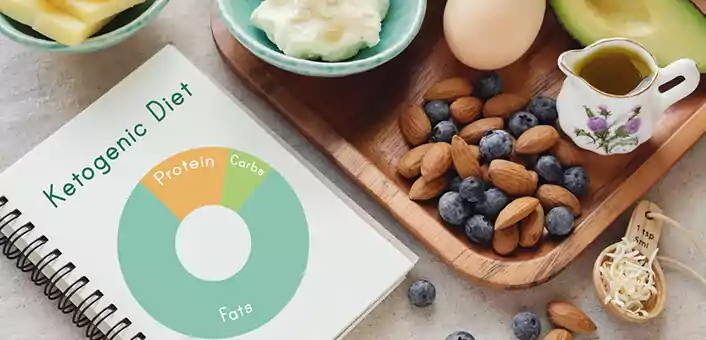PCOS test is based on the Rotterdam criteria for diagnosing PCOS.

Living Well
A ketogenic (or simply, keto) diet involves a drastic reduction in carb intake and replacing it with fat. A small pilot study involving 11 women found that a low-calorie ketogenic diet led to significant improvement in weight. It also decreased levels of circulating male hormones, improved the LH/FSH ratio and decreased free insulin in women with PCOS. However, when you go on a keto diet, you may experience some short-term discomfort, known as keto flu.
Our normal diets are carb-heavy. We consume about 60% carbs in our diets every day, which serve as our primary source of energy. A shift to a diet that has only around 5% carbs is bound to affect our body until it gets used to it. Your body has always used glucose to burn as fuel and now it has to get used to using ketones. This transition period is referred to as “keto adaptation.” Keto flu literally feels as if you have got the flu.
Brain fogginess starts around the second or third day of going on a keto diet. Your brain is designed to run on glucose. If you do not give enough glucose but an alternative fuel to your brain, it gets confused for a while trying to adapt to this new fuel. You’ll find it difficult to concentrate and feel lethargic. Headaches, nausea and muscle cramps follow.
Constipation may occur a couple of days later as you have cut down on a lot of fibrous foods, such as beans, legumes, and whole grains, which you were eating earlier. Ketosis is known for its diuretic effect and you may also get dehydrated. You might also feel decreased strength and endurance.
Keto flu is inevitable. But for how long it will affect you depends on how best your body adapts to the new, almost radical, diet. There are some tips you can use to drive keto flu away faster.
Within a week or so, if you are persistent, the symptoms of keto flu will pass. If you feel a renewed sense of energy, your body would have completely adapted to a keto diet.
A ketogenic diet is an effective diet because it restricts the consumption of carbohydrates. In PCOS, insulin resistance and subsequent hyperinsulinemia are at the heart of the condition. While a low carb diet can surely benefit any woman with PCOS, the ketogenic diet takes “low carbs” to a different level. The diet isn’t just for everyone.
Instead, PCOS patients can get a lot of value from the LCHF or Low Carb, High Fat diet. Many people tend to use the two names interchangeably. But these two diets are different.
Remember, PCOS can be reversed effectively with a proper diet and lifestyle changes that helps in addressing the root causes of this complex condition.